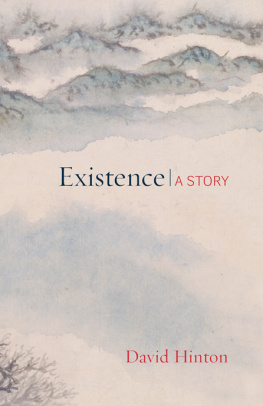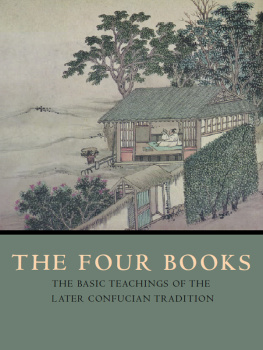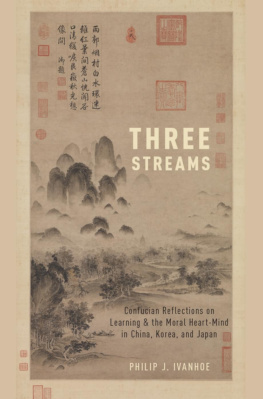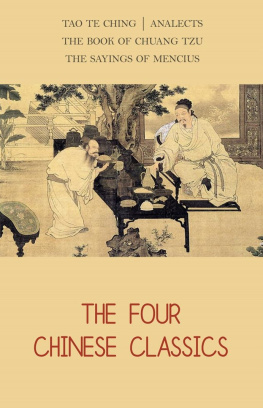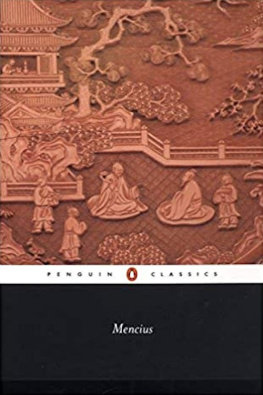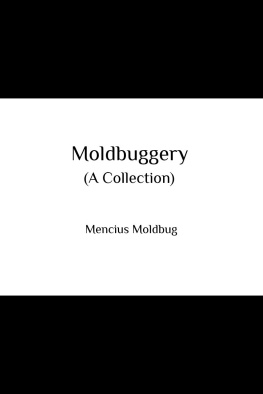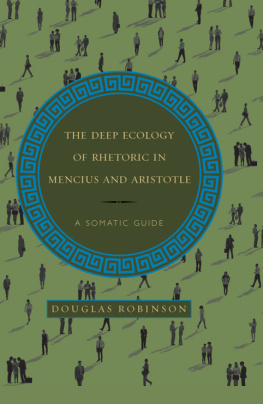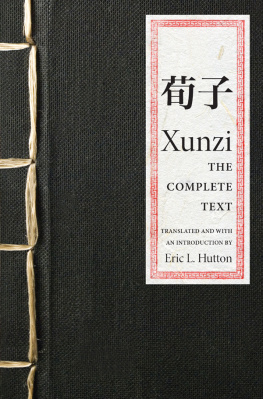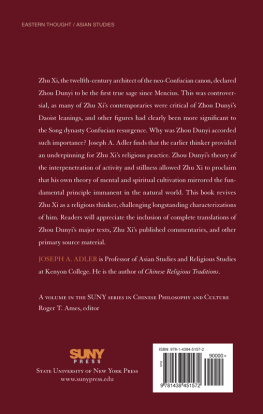
OTHER BOOKS BY DAVID HINTON
Writing
FOSSIL SKY
HUNGER MOUNTAIN: A FIELD GUIDE TO MIND AND LANDSCAPE
Translation
I CHING
THE LATE POEMS OF WANG AN-SHIH
CLASSICAL CHINESE POETRY: AN ANTHOLOGY
THE SELECTED POEMS OF WANG WEI
THE MOUNTAIN POEMS OF MENG HAO-JAN
MOUNTAIN HOME: THE WILDERNESS POETRY OF ANCIENT CHINA
THE MOUNTAIN POEMS OF HSIEH LING-YN
TAO TE CHING
THE SELECTED POEMS OF PO CH-I
THE FOUR CHINESE CLASSICS
ANALECTS
CHUANG TZU: THE INNER CHAPTERS
THE LATE POEMS OF MENG CHIAO
THE SELECTED POEMS OF LI PO
THE SELECTED POEMS OF TAO CHIEN
THE SELECTED POEMS OF TU FU

Translation, introduction, and annotation copyright 2015 by David Hinton
All rights reserved under International and Pan-American Copyright Conventions. No part of this book may be used or reproduced in any manner whatsoever without written permission from the publisher, except in the case of brief quotations embodied in critical articles and reviews.
Library of Congress Cataloging-in-Publication data is available.
Cover art: Auspicious Grain. Anonymous (late 12th c.). Courtesy of The National Palace Museum, Taipei, Taiwan, Republic of China.
Cover design by Gopa & Ted2, Inc.
Interior design by David Bullen
COUNTERPOINT
2560 Ninth Street, Suite 318
Berkeley, CA 94710
www.counterpointpress.com
Distributed by Publishers Group West
10 9 8 7 6 5 4 3 2 1
e-book ISBN 978-1-61902-683-4
CONTENTS
ILLUSTRATION
Auspicious Grain. Anonymous (late 12th century). Courtesy of The National Palace Museum, Taipei, Taiwan, Republic of China.
Image representing the peoples prosperity under a ruler who is fulfilling the Mandate of Heaven. See p. 20.

I n a culture that makes no distinction between those realms we call the heart and the mind, Mencius was the great thinker of the heart. He was the second originary sage in the Confucian tradition, which has shaped Chinese culture for over two thousand years, and it was he who added the profound inner dimensions of human being to the Confucian vision.
In the ruins of a magisterial monotheism, a situation not entirely unlike our own, Confucius (551479 B.C.E.) recognized society as a structure of human relationships, and spoke of those relationships as a system of ritual that people enact in their daily lives, thus infusing the secular with sacred dimensions. There is little sense of the inner self in Confucius thought: identity is determined by a persons ritual roles in the social fabric, and this selflessness contributes deeply to the sense of human community as a sacred rite. The explicit realm of Confucius teachings is occupied with the practical issues of how society works as a selfless weave of caring relationships; and in the implicit realm, that ritual weave is woven into the vast primal ecology of a self-generating and harmonious cosmos.
The Confucian social vision represents the end of a devastating, millennium-long transformation from a spiritualist to a humanist culture, and Mencius (4th C. B.C.E.) invested that humanist vision with its inner dimension by recognizing that the individual too is a part of the primal ecology. He saw all the spiritual depths of that cosmology inside us, and this led to a mystical faith in the inherent nobility of human beings. In his chaotic and war-ravaged times, he was therefore passionate in his defense of the people. Indeed, he advocated a virtual democracy in which a governments legitimacy depended upon the assent of the people. Such is the enduring magic of the Mencian heart full of compassionate and practical concern for the human condition, and yet so empty that it contains the ten thousand transformations of the entire cosmos.
The tangible beginnings of Chinese civilization lie in the archaic Shang Dynasty (c. 17661040 B.C.E.), which bridged the transition from Neolithic to Bronze Age culture. (For an outline of the early dynasties and rulers that figure prominently in Mencius writings, see .) The Shang was preceded by the Neolithic Hsia Dynasty, about which very little is known. It appears that in the Paleolithic cultures that preceded the Hsia, nature deities were worshiped as tribal ancestors: hence a tribe may have traced its lineage back to an originary High Ancestor River, for instance. This practice apparently continued through the Hsia into the Shang, where evidence of it appears in oracle-bone inscriptions. Eventually, although these nature deities continued to be worshiped in their own right, religious life focused on the worship of human ancestors. By forging this religious system into a powerful form of theocratic government, the Shang was able to dominate China for no less than seven hundred years.
The Shang emperors ruled by virtue of their lineage, which was sanctified by Shang Ti (Celestial Lord), a supreme deity who functioned as the source of creation, order, ethics, etc. (Shang here represents two entirely different words in Chinese.) The Shang lineage may even have led to Shang Ti as its originary ancestor. In any case, Shang Ti provided the Shang rulers with a transcendental source of legitimacy and power: he protected and advanced their interests, and through their spirit-ancestors, they could decisively influence Shang Tis shaping of events. All aspects of peoples lives were thus controlled by the emperor: weather, harvest, politics, economics, religion, etc. Indeed, people didnt experience themselves as substantially different from spirits, for the human realm was simply an extension of the spirit realm.
Such was the imperial ideology, so convenient to the uses of power as it accorded little ethical value to the masses, who were not of select lineages. (Not surprisingly, the rise of Shang Ti seems to coincide with the rise of the Shang Dynasty, and later myth speaks of him as the creator of Shang civilization.) In the cruelest of ironies, it was overwhelming human suffering that brought the Chinese people into their earthly lives, beginning the transformation of this spiritualistic culture to a humanistic one. In the cultural legend, the early Shang rulers were paradigms of nobility and benevolence. But by the end of the Shang, the rulers had become cruel and tyrannical, and as there was no ethical system separate from the religious system, there was nothing to shield the people from their depredations. Meanwhile, a small nation was being pushed to the borders of the Shang realm by western tribes. This state of semi-barbarian people known as the Chou gradually adopted the cultural traits of the Shang. Eventually, under the leadership of the legendary sage-emperors Wen (cultured) and Wu (martial), the Chou overthrew the tyrannical Shang ruler, thus founding the Chou Dynasty (1040223 B.C.E.), which was welcomed wholeheartedly by the Shang people.
The Chou conquerors were faced with an obvious problem: if the Shang lineage had an absolute claim to rule the world, how could the Chou justify replacing it with their own, and how could they legitimize their rule in the eyes of the Shang people? Their solution was to redefine Shang Ti as Heaven, thus ending the Shangs claim to legitimacy by lineage, and then proclaim that the right to rule depended upon the Mandate of Heaven: once a ruler becomes unworthy, Heaven withdraws its mandate and bestows it on another. This was a major event in Chinese philosophy: the first investment of power with an ethical imperative. And happily, the early centuries of the Chou appear to have fulfilled that imperative admirably.
Next page

